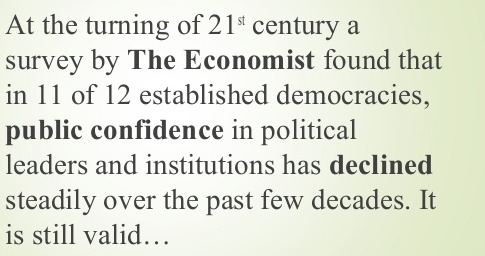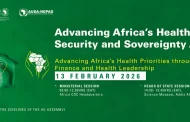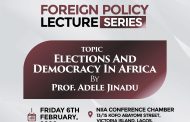There is a resurgence of attention on deliberative democracy in the Western world. Seminars upon seminars aside from huge research essays on it. An African student on a Western campus finds him or herself being taken aback by the quantum of it. Haven’t this people attained whatever democracy is possible? A local can walk up to a member of parliament and give him or her a task or lay a complaint which the parliamentarian must take seriously. What else is left to add to democracy over here in contrast to back in much of Africa where the typical voter sees the typical parliamentarian only once in four years? Or, never sees him beyond perfunctory appearances at weddings or such communal activities?

Democracy as fury and boastfulness in the era of President Trump captured here by The Guardian (UK)

Which variant serves us better hence?
The Westerners knew what they were doing. They were anticipating a Donald Trump and they were so apprehensive of such a reality that they didn’t realise they were taking a concept and practice from a Marxist group – the Frankfurt scholars. Although the Frankfurt scholars started the most serious criticism and upturning of classical Marxism after Lenin, it was they who equally coined or came up with the notion of deliberative democracy. But in its current form, it is difficult to put it beyond The Economist in terms of the articulation of the problem with democracy.
This is a part of what the magazine wrote in its December 21st, 1996 edition in a survey on democracy: “The starting point of modern democracy is the belief that every sane adult is entitled to an equal say in the conduct of public affairs… There is, therefore, something odd in the fact that in most democracies, this voice is heard only once every few years in elections in which voters choose a president or send representatives to an elected parliament and between these elections, for periods of anything up to seven years, it is the presidents and parliamentarians who do all the deciding while the rest of the democracy is expected to stand more or less quietly on one side, either nodding its heads in irrelevant approval or growling in frustrated disagreement. This is part-time democracy”.
It was the powerful response to its argument that “democracy in the 20th century has been a half-finished thing” and “may in the 21st century realise that it has so far been living, for understandable reasons, in a state of arrested development”.
In other words, The Economist which some people call the holy book for neoliberal globalisation is in agreement with late Claude Ake of Nigeria or Fela Anikulapo Kuti, also of Nigeria, that liberal democracy is no democracy but, in fact, a repudiation of the very essence of democracy. That is what Ake said in a keynote address to a Conference on Democratisation in Kampala, Uganda in 1992. Fela’s pop culture concept for the same position is the concept of ‘demonstration of crazy’, aka ‘demon-crazy’.

 It should be time to rethink when The Economist, Aide-de-Camp to neoliberal globalisation, a radical political economist like Ake and a beacon of popular culture like Fela are in agreement about a subject matter, especially after their fears have been realized in a Donald Trump’s unschooled populism. Of course, it makes no sense to extract Trump from the current in US domestic politics that produced him, he is still an explanation for why democracy is dangerous in how it puts power in the hands of people with absolutely no other control than their conscience. Oh yes!
It should be time to rethink when The Economist, Aide-de-Camp to neoliberal globalisation, a radical political economist like Ake and a beacon of popular culture like Fela are in agreement about a subject matter, especially after their fears have been realized in a Donald Trump’s unschooled populism. Of course, it makes no sense to extract Trump from the current in US domestic politics that produced him, he is still an explanation for why democracy is dangerous in how it puts power in the hands of people with absolutely no other control than their conscience. Oh yes!
Democrats keep shouting about structures and institutions acting as a check on the behaviour of the power wielder. Hitler has messed that up since with his brand of nationalism. Any little doubt left has been completely erased by Donald, the son of Trump. Within just four years, he as a one-man squad set the so-called Liberal World Order on fire. And nobody could stop him. Across the world, there are other little tyrants doing the same thing on smaller scale. And nobody can stop them. Almost everywhere else, it is ‘demonstration of crazy’.

He could police democracy in Tanzania but how many of his types are still around?

An even more apt question!
In spite of his support for classical Empire, there is something brilliant from the Historian Niall Ferguson when he said that governments can never help society. And went on to suggest the civil society as a credible alternative to the state. But as Bjorn Beckman asked long before Ferguson delivered his lecture, are the state and civil society such distant cousins? The professors of Philosophy, Ethics, History, Politics, etc from the universities of Edinburgh, Glasgow, Queen and Strathclyde University who threw questions at the lecture in question also didn’t share that position but only because they were good, old defenders of the state as a concept. That is, they disagreed with Ferguson but not in the same sense as Beckman’s activist point. And Beckman was, indeed, right because although the civil society commands immense power resources in the capacity to narrativise and politicise any contradiction into a contestation, most sitting governments and/or a state can create own civil society.
All these make a case for another look at ‘Platonic communism’, Arostotle’s contempt for democracy and, lastly, the theory of deliberative democracy. Nyerere’s notions of how to police democracy remains inviting but very limited because the honest headmaster to do that as Nyerere did in Tanzania are not there anymore! It seems the world is in need of a thinker who can reformulate democracy.
There is no reason why this cannot start in Nigeria where the eggheads appear to have, indeed, started the debate already. The February 9th, 2018 debate on procedural and substantive democracy cannot but be rated otherwise. Luckily it was an inconclusive conversation that must be started all over!




























